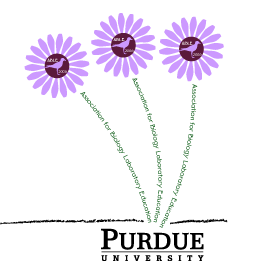Site Links
![]() ABLE 2007: University of Kentucky, Lexington, KY June 5-9. Host: Ruth Beattie
E-mail: rebeat1@uky.edu
ABLE 2007: University of Kentucky, Lexington, KY June 5-9. Host: Ruth Beattie
E-mail: rebeat1@uky.edu


Major Workshops
Wednesday June 7
Linda Robinson, University of Pennsylvania
Genetics of Arabidopsis thaliana
In this workshop, I'll present an abbreviated version of a multi-week lab that
investigates genetics in the plant, Arabidopsis thaliana. Arabidopsis is
a good model system for studying genetics because the seedlings are easy to
grow in the laboratory, the phenotypes are easily observable, the DNA extraction
procedure for genotypic analysis is straightforward, and there are a large
number of mutants available. This lab exercise emphasizes hypothesis
testing, as students develop and test hypotheses as to the phenotypic ratios
that will occur in F2 generation plants resulting from a dihybrid cross of Arabidopsis plants. Students
first determine the phenotypic ratios for two traits, hypocotyl length and presence
of trichomes, in seedlings that they planted a week earlier. Then their
results are compared to predictions made based on Mendel's laws using the chi-square
statistical test. Finally, genotypes of the plants are analyzed for the
hypocotyl length trait by extracting DNA from the seedlings, using PCR to amplify
the alleles, and subjecting the PCR products to gel electrophoresis. Since
both the phenotype and genotype of the same plant are determined for one of the
traits, the concept of genetic penetrance is also introduced. Students
learn that the relationship between genotype and phenotype is not always straightforward,
and that a given genotype does not always result in the predicted phenotype. During
the workshop, participants will analyze the phenotype of provided seedlings,
extract DNA, set up PCR reactions, and discuss the genotypic analysis, as well
as possibilities for modifying the lab based on the needs of the participants.